
Lexington’s African American Heritage Walking Tour

Join us for an on-demand walking tour of Downtown Lexington’s African American heritage sites.

Join us for an on-demand walking tour of Downtown Lexington’s African American heritage sites.

Explore topics related to Science, Technology, Engineering, Art, and Math (STEAM) in this space for youth, grades 3-12.
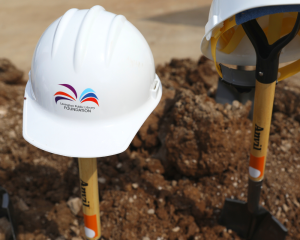
Learn how the Lexington Public Library Foundation empowers change within our library system.

Learn or develop a personal or professional skill with LinkedIn Learning classes, available for free with your library card.
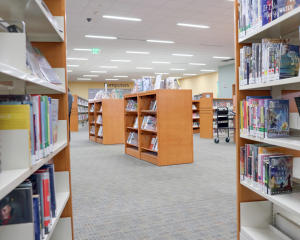
Did you know physical materials renew automatically if they don’t have a waiting list? Check your account online to see the status of your items.

Amended and Restated Bylaws of the Friends of the Lexington Public Library, Inc.
Join us for a walking tour of Downtown Lexington’s historic sites. The full tour is available as a single MP3, or you can download individual tracks. For the single MP3, music will play between the stops. You can pause the track while you walk between stops.
This tour covers a walking distance of 1.1 miles.
The music clips used in this tour are from “Walking Barefoot on Grass” by Kai Engel, and are used with a CCBY license. It is available here: http://freemusicarchive.org/music/Kai_Engel/
The Materials Selection Policy was initially adopted February 25, 1987 by the Lexington Public Library Board of Trustees and was revised March 24, 1993. The Materials Selection Policy was updated and renamed the Collection Development Policy which was approved by the Board on January 14, 2009. The Board of Trustees assumes full responsibility for all legal actions which may result from the implementation of any policies stated herein.
When you log into many of our services, you'll be asked to provide a PIN (Personal Identification Number) in addition to your library card number. Your default PIN is typically the last 4 digits of the phone number on file for your account.
Download eBooks, audiobooks, magazines, and more – free with your library card.
The Lexington Public Library’s Digital Archives provide open access to researchers and students to learn more about the rich history of Lexington and Fayette County. It contains a fraction of the Library’s physical holdings, which are housed and available for reference in the Kentucky Room at the Central Library. New material is being digitized and added constantly, so there's always something new to find.
The archives have a simple keyword search, and it is possible to browse the collections by subject, area, or decade. The Lexington Public Library actively reviews and labels materials in our archives with statements that indicate how you may reuse the images, and what sort of permission, if any, you need to do so. Please check the information for each image to determine its legal status.
Please complete this form to request a Destination Kindergarten Storytime Kit. Kits may be borrowed for 2 weeks. Each kit contains: 5-7 books, a binder with songs, action rhymes, and fingerplays, and several classroom manipulatives for activities.
Wonderful podcasts and walking tours have been created by our staff. Please enjoy!
Library meeting rooms are available for individuals, non-profit, for profit, study groups, and community organizations seeking to hold meetings, trainings, and workshops. Meeting rooms are free of charge. Sterno and other tools/equipment that have an open flame are prohibited.
The Lexington Public Library offers an Interlibrary Loan (ILL) service which allows cardholders in good standing to borrow books and magazine articles we do not own and cannot purchase. The Lexington Public Library also lends our books to libraries both inside and outside the Commonwealth of Kentucky.
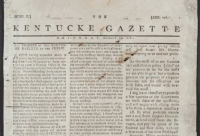
The Kentucky Gazette was the first paper established west of the Allegheny Mountains, founded by John and Fielding Bradford. The frontier paper focused on East Coast and International news, though some local announcements can be found. Later, the paper focused on disseminating opinions on politics and issues of concern on the frontier. When political parties emerged, the paper developed a Democratic (conservative at the time) bent. John Bradford handed the reins of the paper over to his son, Daniel Bradford, in 1802.
While still owned and occasionally edited by the Bradford family, the paper had several editors and publishers through the mid-1830s, when Daniel Bradford returned to the paper’s byline as editor. Daniel Bradford edited the paper until 1840, when he sold it to Jim Cunningham. The paper shuttered in 1848, due to Cunningham’s failing health, but was revived in 1866 and published until 1910 by different publishers.
The years 1841-1910 are not digitized as of January 2020, but are viewable on microfilm and in print in the Kentucky Room at Central Library. Selected articles are indexed in the Library’s Local History Index.
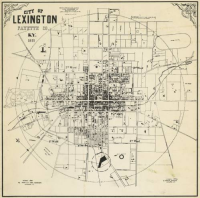
Library meeting rooms are available for individuals, non-profit, for profit, study groups, and community organizations seeking to hold meetings, trainings, and workshops.
The Central Library's Parking Garage is available to our customers or anyone needing a parking space. There are 428 parking spots in the garage, 10 of which are handicapped or van accessible. The height clearance for garage entry is 13'1". The height clearance for parking access is 6'4".
Two hours of free parking is provided with a ticket validated inside the Central Library.
These tours are guided audio walking tours with a variety of topics focused on Downtown Lexington, KY. Music will play in between each stop, and the listener can pause the track while walking between stops.
Want to learn about new tours as they become available? Subscribe to our Genealogy & Local History newsletter.
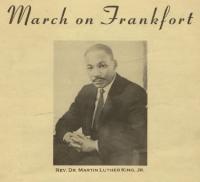
Meet with a librarian for one-on-one consultation. Please submit the Book a Librarian Appointment Request Form or call 859-231-5500 during business hours to schedule an appointment. Appointments are scheduled Monday-Friday during Library business hours and typically last 30 to 45 minutes.
Description coming soon.
Thanks for your interest in joining the Lexington Public Library! Your library card is the key to checking out books, downloading audiobooks, taking online classes, and much more. Please check here to find out if you qualify for a library card and how to apply.
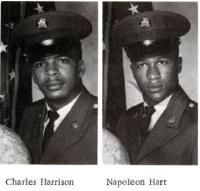
The United States Army Armor School began in 1940 as the Armored Force School and Replacement Center at Fort Knox, Kentucky. It spent a few years post World War II as inactive, until the 3rd Armored Division was reactivated in 1947, and became the US Army Training Center, Armor (USATCA), in 1956. Both Army and Marines soldiers received training on a variety of subjects and equipment.
Fort Knox hosted the school until it moved to Fort Benning, Georgia, in 2010, as the US Army Armor School. The yearbooks in the collection contain the names and photographs of the officers, NCOs, and graduates of the 8 week basic combat training at Fort Knox. There are also many photographs of the various buildings, training, and activities.
This is your gateway to our most popular resources. Search for books and eBooks, access tools for research and learning, and discover our unique collection of genealogy and local history materials.
Whether you're just starting out, changing careers, or returning to the workforce, finding a job can be tough. We can help you land the right position and answer your questions along the way.
Craig Cammack is a graduate of Hanover College, where he studied political science and social movements. He has been a vocal advocate for legislation promoting equality and fairness. Craig was Chairman of Lexington Fairness in 2010, 2011, and 2012. While Craig served on the board, Lexington Fairness grew dramatically with a focus on outreach to Ally support groups, organizations and businesses.
Join us for a walking tour of Downtown Lexington’s African American Heritage Sites. The full tour is available as a single MP3, or you can download individual tracks. For the single MP3, music will play between the stops. You can pause the track while you walk between stops.
This tour covers a walking distance of 1.7 miles.
The music clips used in this tour are from “Walking Barefoot on Grass” by Kai Engel, and are used with a CCBY license. It is available here: http://freemusicarchive.org/music/Kai_Engel/
Check here for your school's list of summer assignments.
Have a question? Ask us! You can contact us via email, phone, chat, or text. Book a librarian for one-on-one help. Suggest a purchase to help us improve our collection.